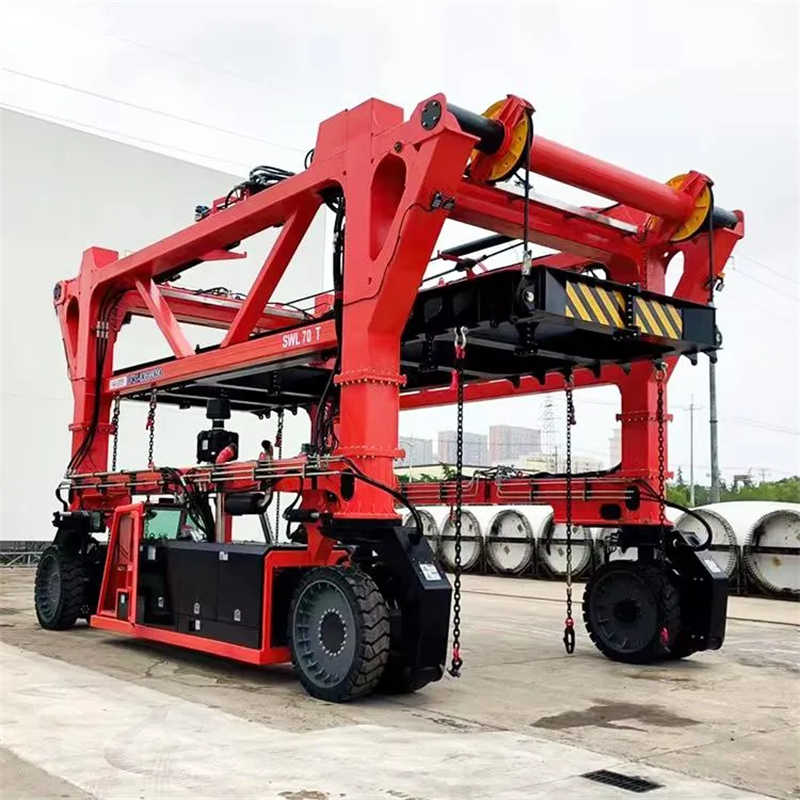Container Straddle Carrier Manufacturers: Driving Efficiency in Modern Logistics
The global logistics industry is undergoing a transformative shift, driven by the need for faster, more efficient, and sustainable operations. At the heart of this transformation are Container Straddle Carriers, specialized equipment designed to handle the movement and stacking of containers with precision and speed. As demand for these machines grows, manufacturers of Container Straddle Carriers are playing a pivotal role in shaping the future of logistics. This article explores the key aspects of these manufacturers, their innovations, and their impact on the industry.
What is a Container Straddle Carrier?
A Container Straddle Carrier is a heavy-duty vehicle used primarily in ports, terminals, and logistics hubs to transport and stack shipping containers. Its unique design allows it to “straddle” containers, lifting them from above and moving them efficiently across short to medium distances. With the ability to handle containers of various sizes (20-foot, 40-foot, and 45-foot), Straddle Carriers are indispensable in modern container handling operations.

The Role of Straddle Carrier Manufacturers
Manufacturers of Container Straddle Carriers are at the forefront of innovation, addressing the evolving needs of the logistics industry. Their contributions include:
1. Advanced Engineering and Design
Leading manufacturers invest heavily in research and development to create Straddle Carriers that are not only robust but also highly efficient. Key design features include:
- High Load Capacity: Capable of handling containers weighing up to 50 tons or more.
- Maneuverability: Advanced steering systems (e.g., all-wheel steering, crab steering) for easy navigation in tight spaces.
- Durability: Use of high-strength materials to withstand harsh operating conditions, such as extreme temperatures and heavy usage.
2. Integration of Smart Technologies
Modern Straddle Carriers are equipped with intelligent systems that enhance operational efficiency and safety. These include:
- Automation: Semi-autonomous or fully autonomous operation to reduce human error and labor costs.
- IoT Connectivity: Real-time monitoring of equipment performance, enabling predictive maintenance and minimizing downtime.
- Safety Features: Sensors and cameras to prevent accidents and ensure safe operation in busy environments.
3. Focus on Sustainability
As environmental concerns take center stage, manufacturers are developing eco-friendly Straddle Carriers. Innovations include:
- Electric and Hybrid Models: Zero-emission electric Straddle Carriers and hybrid models that reduce fuel consumption and carbon footprint.
- Energy-Efficient Systems: Regenerative braking and energy recovery systems to optimize power usage.
4. Customization for Diverse Needs
Manufacturers understand that different logistics operations have unique requirements. As a result, they offer customizable solutions, such as:
- Adjustable lifting heights and spans to accommodate various container sizes.
- Specialized configurations for specific environments, such as ports, rail yards, or logistics parks.
Leading Manufacturers in the Industry
Several companies have established themselves as leaders in the Container Straddle Carrier market. These include:
- Dongqi Crane (China): Known for its high-performance and cost-effective Straddle Carriers, Dongqi Crane offers a wide range of models tailored to global logistics needs.
- Kalmar (Finland): A pioneer in port equipment, Kalmar provides advanced Straddle Carriers with cutting-edge automation and energy-efficient technologies.
- Liebherr (Germany): Renowned for its engineering excellence, Liebherr manufactures robust and reliable Straddle Carriers for heavy-duty applications.
- Taylor Machine Works (USA): Specializing in durable and versatile equipment, Taylor offers Straddle Carriers designed for demanding environments.
Challenges and Opportunities
While the industry is thriving, manufacturers face several challenges:
- High Initial Costs: The advanced technologies and materials used in Straddle Carriers can make them expensive, posing a barrier for some customers.
- Maintenance Complexity: Smart systems require skilled technicians for maintenance and repairs.
- Market Competition: With increasing demand, competition among manufacturers is intensifying, driving the need for continuous innovation.
However, these challenges also present opportunities:
- Growing Demand in Emerging Markets: Expanding ports and logistics hubs in Asia, Africa, and South America offer significant growth potential.
- Adoption of Automation: The push for automation in logistics creates opportunities for manufacturers to develop next-generation Straddle Carriers.
- Sustainability Trends: The global focus on reducing carbon emissions opens doors for electric and hybrid models.
The Future of Container Straddle Carrier Manufacturing
The future of Straddle Carrier manufacturing is bright, with several trends shaping the industry:
- Increased Automation: Fully autonomous Straddle Carriers will become more common, enhancing efficiency and reducing labor costs.
- Green Technologies: Manufacturers will continue to innovate in electric and hybrid models, aligning with global sustainability goals.
- Digital Integration: Straddle Carriers will become part of interconnected logistics ecosystems, leveraging data analytics and AI for optimized operations.
Conclusion
Container Straddle Carrier manufacturers are driving the evolution of modern logistics by delivering innovative, efficient, and sustainable solutions. As the demand for faster and greener container handling grows, these manufacturers will continue to play a critical role in shaping the future of global trade and transportation.
For logistics operators, investing in a high-quality Straddle Carrier from a reputable manufacturer is not just a purchase—it’s a step toward achieving operational excellence and staying competitive in a rapidly changing industry.
Keywords: Container Straddle Carrier, Straddle Carrier Manufacturers, Logistics Equipment, Port Operations, Sustainable Logistics, Automation in Logistics, Automated straddle carrier.
